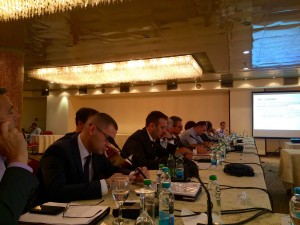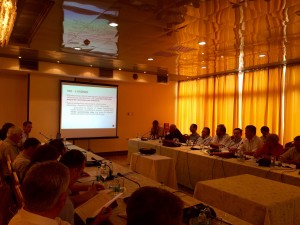Research paper “Taxation of Wages and the Informal Economy” made by Center for Research and Studies GEA in cooperation with Union of Employers’ Associations of RS, funded by International Labor Organization (ILO), was presented at this event.Round table “The Decrease of Labor Taxation – Road to Economic Growth” was organized on July 14, 2016 at Hotel Bosna, Banja Luka, by Union of Employers’ Associations of RS. Some of the participants were representatives of employers and unions, Government of the Republic of Srpska, institutions, funds, academic, and expert communities, World Bank, Delegation of the EU to B&H, nongovernmental organizations, and media. This event was aimed at encouraging expert debate and general dialogue on the decrease of labor taxes as one of important challenges facing the entire society.
Program director of Center for Research and Studies GEA, Ognjen Djukic, presented the research and these are the key findings:
- High rates of taxes on wages create financial ”encouragement” for informal employment, which is one of key elements of the informal economy. When the
 worker’s employment is undeclared, all fiscal and parafiscal obligations related to their employment remain unsettled, primarily income tax and social contribution: If the worker is registered but a portion of their wage is paid “under the table” (grey economy), then some of the financial obligations are avoided.
worker’s employment is undeclared, all fiscal and parafiscal obligations related to their employment remain unsettled, primarily income tax and social contribution: If the worker is registered but a portion of their wage is paid “under the table” (grey economy), then some of the financial obligations are avoided. - There are many negative consequences of informal employment such as a decrease in public revenues, influence on conditions and quality of labor, unfair competition, decreased use of standard work forms, and increased social dissatisfaction.
- Negative influence of informal employment is most present among workers with low salaries because it usually leaves them without healthcare, pension, or unemployment insurance.

- Labor tax burden expressed as a share of tax wedge in the average wage in RS is 38,5%. It means that for every 100 BAM gross wage one must deduct 38,5 BAM to pay tax and social contribution, leaving the worker with 61,5 BAM of net salary. This represents a significant increase of tax wedge in comparison with 2008 and earlier (before economic crisis), by which the Republic of Srpska exceeded the OECD countries average and became closer to the EU average.
- Generally speaking, the EU is an area of high tax burden on labor in comparison with other developed economies, so the Europe 2020 strategy emphasizes that “… increasing labor taxes, like it was performed so far, which causes high job expenses, should be avoided.”
- In the Republic of Srpska, employers have identified the amount of income tax and social contribution as one of the biggest problems for doing business in the formal sector and they argue that reform in this area should be implemented as soon as possible.
- Many international research papers have also identified income taxes and contributions as the main cause of the informal economy.
- Society’s perception of the justifiability of the amount of tax burden and quality of services provided by the public sector is also very important.
The following recommendations were defined:
- Determine tax wedge in the Republic of Srpska equal to the level from 2008 (when it was 32.7% for an average wage) or lower.
- Tax wedge decrease should be designed in such a way the decrease is the most for low wages.
- Increase labor quality and independence of control bodies.
- Develop additional stimulation measures for transition from the informal to the formal sector.
- Strengthen social responsibility and awareness of all actors about negative consequences of working in the informal sector.
- This process should be supported through a comprehensive campaign of strengthening fiscal responsibility and transparency of the public sector.
- All upper mentioned measures should be implemented as a whole.
Find the complete document in English here.
ATV report on the subject:

